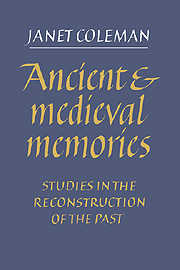Book contents
- Frontmatter
- Contents
- Preface
- List of abbreviations
- PART I THE CRITICAL TEXTS OF ANTIQUITY
- Introduction
- PART II THE PRACTICE OF MEMORY DURING THE PERIOD OF TRANSITION FROM CLASSICAL ANTIQUITY TO THE CHRISTIAN MONASTIC CENTURIES
- Introduction
- PART III THE BEGINNINGS OF THE SCHOLASTIC UNDERSTANDING OF MEMORY
- Introduction
- PART IV ARISTOTLE NEO-PLATONISED: THE REVIVAL OF ARISTOTLE AND THE DEVELOPMENT OF SCHOLASTIC THEORIES OF MEMORY
- Introduction
- 15 Arabic and Jewish translations of sources from antiquity: their use by Latin Christians
- 16 John Blund, David of Dinant, the De potentiis animae et obiectis
- 17 John of La Rochelle
- 18 Averroes
- 19 Albert the Great
- 20 Thomas Aquinas
- PART V LATER MEDIEVAL THEORIES OF MEMORY: THE VIA ANTIQUA AND THE VIA MODERNA.
- Introduction
- Conclusion: an all too brief account of modern theories of mind and remembering
- Bibliography
- Index
15 - Arabic and Jewish translations of sources from antiquity: their use by Latin Christians
The ‘Prose Salernitan Questions’ Isaac Israeli, Avicenna (Nemesius of Emesa, John of Damascus)
Published online by Cambridge University Press: 06 January 2010
- Frontmatter
- Contents
- Preface
- List of abbreviations
- PART I THE CRITICAL TEXTS OF ANTIQUITY
- Introduction
- PART II THE PRACTICE OF MEMORY DURING THE PERIOD OF TRANSITION FROM CLASSICAL ANTIQUITY TO THE CHRISTIAN MONASTIC CENTURIES
- Introduction
- PART III THE BEGINNINGS OF THE SCHOLASTIC UNDERSTANDING OF MEMORY
- Introduction
- PART IV ARISTOTLE NEO-PLATONISED: THE REVIVAL OF ARISTOTLE AND THE DEVELOPMENT OF SCHOLASTIC THEORIES OF MEMORY
- Introduction
- 15 Arabic and Jewish translations of sources from antiquity: their use by Latin Christians
- 16 John Blund, David of Dinant, the De potentiis animae et obiectis
- 17 John of La Rochelle
- 18 Averroes
- 19 Albert the Great
- 20 Thomas Aquinas
- PART V LATER MEDIEVAL THEORIES OF MEMORY: THE VIA ANTIQUA AND THE VIA MODERNA.
- Introduction
- Conclusion: an all too brief account of modern theories of mind and remembering
- Bibliography
- Index
Summary
Whether beautiful or ugly or just conveniently at hand, the world of experience is produced by the man who experiences it… There certainly is a real world of trees and people and cars and even books, and it has a great deal to do with our experiences of these objects. However, we have no direct, immediate access to the world, nor to any of its properties… Whatever we know about reality has been mediated, not only by the organs of sense but by complex systems which interpret and reinterpret sensory information. The activity of the cognitive systems results in – and is integrated with – the activity of muscles and glands that we call ‘behavior’. It is also partially – very partially – reflected in those private experiences of seeing, hearing, imagining, and thinking to which verbal descriptions never do full justice.
Ulric Neisser, Cognitive Psychology (New York, 1967), p. 3.The Syriac-speaking peoples of the Near East cultivated the art of translation from as early as the fourth century and provided Syriac versions of ancient Greek writings on science and philosophy later used by the Arab world. In the eastern Mediterranean, the ancient syllabus continued to be taught in Syriac translations.
- Type
- Chapter
- Information
- Ancient and Medieval MemoriesStudies in the Reconstruction of the Past, pp. 328 - 362Publisher: Cambridge University PressPrint publication year: 1992

